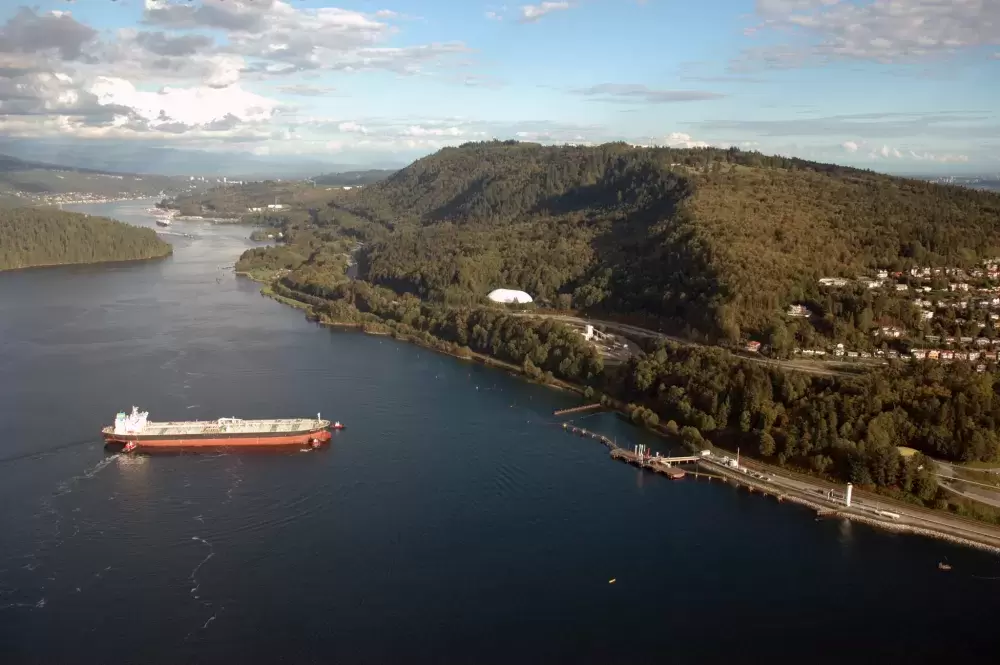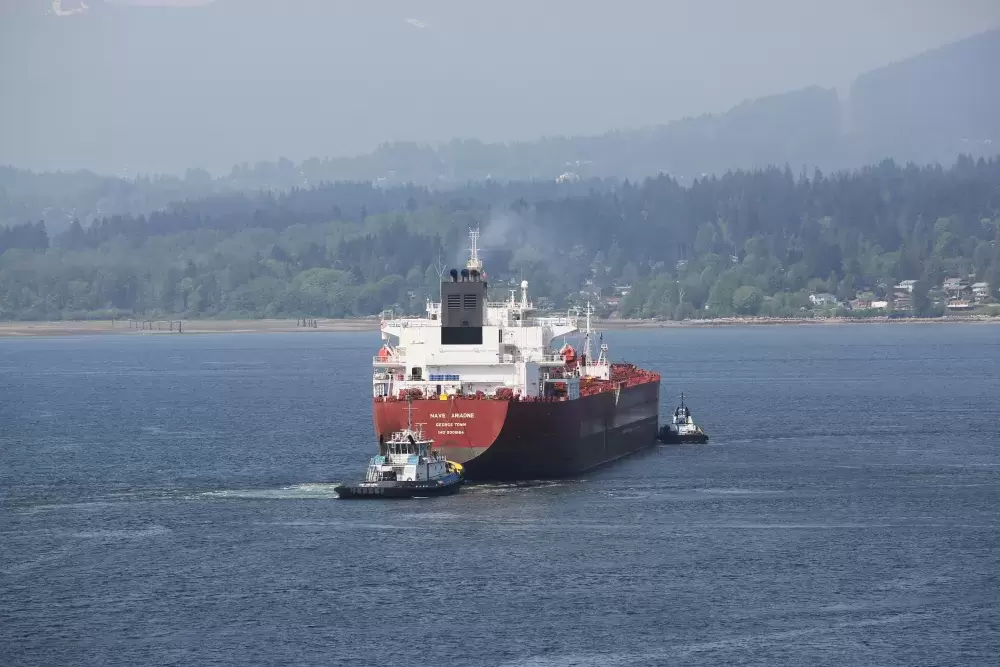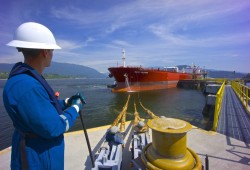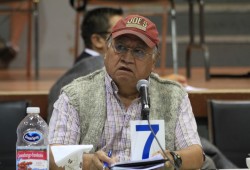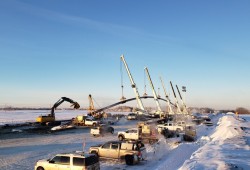Within nine months, the amount of crude oil being shipped by southern Vancouver Island is expected to multiply with the completion of the Trans Mountain pipeline expansion, bringing calls for a stronger Nuu-chah-nulth presence to monitor the activity.
After its development began over a decade ago, the twinning of the Trans Mountain pipeline is over 80 per cent complete. Once finished, the expansion will increase the line’s capacity from 300,000 barrels to 890,000 a day being piped from northeast of Edmonton to the Westridge Terminals in Burnaby. This is expected to increase the number of oil tankers leaving the terminals from five to 34 a month, according to Trans Mountain, representing a 14 per cent overall increase in the Port of Vancouver’s marine traffic.
The shipping lanes for these tankers include waters off the southwestern coast of Vancouver Island, a presence in Nuu-chah-nulth territory that could warrant a stronger voice in the oversight of the pipeline expansion project. On July 12 Trina Sxwithul’txw of the Indigenous Advisory Monitoring Committee made a presentation to the Nuu-chah-nulth Council of Ha’wiih Forum on Fisheries, inviting the First Nations’ leaders to join the group. The committee currently has one vacancy for the Vancouver Island Western Approach region.
One hundred and twenty-nine First Nations are listed as being directly impacted by the 1,150-kilometre pipeline’s expansion. But Sxwithul’txw noted that the government’s assessment of how communities will be affected has not always been accurate.
“We’re working hard to put the onus back on the government to correct the mistakes, because they’ve included First Nations that should not have been included on their impacted list,” she said.
The Pacheedaht and Ditidaht First Nations are among those listed. But regulators have so far downplayed the risk that Nuu-chah-nulth nation’s face; a past report from the National Energy Board stated that the increased tanker traffic would have a “minor” impact on Ditidaht fishing, while its effect on Maa-nulth nations would be “negligible”.
Trans Mountain has funneled oil to the West Coast since 1956. Although 84 spills have been reported along the pipeline – nine of which were over 1.5 cubic metres (approximately 9.5 barrels) – no petroleum product has spilled from the pipeline’s tankers, according to the company.
But the National Energy Board’s Crown Consultation and Accommodation Report warned that this might not always be the case.
“[O]ver the life of the project the probability of small spills is high,” stated the NEB. “The Crown acknowledges that Aboriginal peoples who rely on subsistence foods and natural resources are at greatest risk for adverse effects from an oil spill regardless of its size.”
This is why the Indigenous Advisory Monitoring Committee was formed. Now the Council of Ha’wiih is considering more involvement.
“I believe that this is important for our people to consider, but we need to have the time,” said Wickaninnish, Cliff Atleo, chair of the fisheries forum.
With the volume of crude oil being shipped offshore due to nearly triple, the federal government has bulked up spill response capacity with hefty investments. A new West Coast Marine Response Corporation base has been built in Port Alberni, with seven vessels, plus another two stationed in Ucluelet. Set up to serve the west coast of Vancouver Island, the base has the ability to handle a 2,500-tonne spill within six hours, according to the WCMRC.
But Atleo isn’t comfortable with the government’s emphasis on preparing for an inevitable disaster, rather than prevention.
“Hopefully this process is going to have some influence, because the process and the system, it accepts far too readily disasters,” he said. “We see it far too readily in the states, everywhere there is a pipeline. Every once in a while, they have a burst. Thousands and thousands of barrels go into the sea. Who pays for that? Over here it’s going to be us.”
Archie Little, a councillor with the Nuchatlaht First Nation, was working on a halibut fishing boat off the coast of Alaska when one of the worst tanker spills in history hit the region. It was just after midnight on March 24, 1989 when the Exxon Valdez hit a reef in Prince William Sound. Over the following days 260,000 barrels spread across 2,100 kilometres of coast.
“We have to understand that when we have a spill, it’s going to impact other resources,” said Little, referencing the Nuu-chah-nulth belief that all is connected. “We need to think of this as hišuk ma c̕awak, because whatever is going to happen is going to impact a lot of things. We need to be the eyes, the monitors.”
As a means to accommodate the concerns of individual First Nations, Trans Mountain has signed mutual benefit agreements with 69 Indigenous communities, including the Pacheedaht and Ditidaht, who submitted letters of support to the pipeline project.
Each of these confidential agreements detail a “voluntary and mutually beneficial long-term relationship” with a First Nation, said Trans Mountain.
“The benefits can include pipeline construction education and jobs training, skills enhancement, business opportunities or improved community services and infrastructure,” wrote the company in an email to Ha-Shilth-Sa.
Amid stalled progress due to opposition and regulatory conditions, the Government of Canada bought Trans Mountain for $4.5 billion in 2018 – a push to move the project forward to open up Alberta crude to Asian markets. Now industry experts estimate the Trans Mountain expansion has cost over $30 billion, while it appears that the majority of its tankers will be destined for the west coast of the United States rather than the intended destinations overseas. Currently Russia has flooded Asia with cheap crude oil, as sanctions have cut it off from other markets due to the invasion of Ukraine.
Wherever the tankers will be destined, increased traffic in Nuu-chah-nulth waters is inevitable, bringing an interest in the Indigenous Advisory Monitoring Committee.
“I think it’s imperative that the chiefs really consider this as part of a plan forward,” said Tla-o-qui-aht elder Barney Williams during the fisheries forum on July 12. “It’s important based on some of the experiences of the past…we were the first responders.”
“When that oil spill does happen, the knowledge gap between the areas of the nations that aren’t participating, it would really be missed,” added Huu-ay-aht representative Larry Johnson. “There’s not a lot of west coast knowledge out there right now.”

